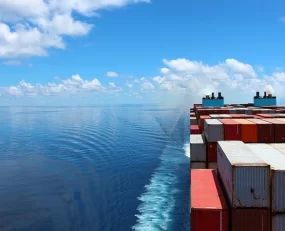
A.P. Moller – Maersk recently announced a strategic partnership with US-based project developer Carbon Sink LLC to develop green methanol production facilities in the US, starting with a 100,000 tonne per year. Maersk intends to purchase the full volume of green methanol produced at the plant, with options for the output of subsequent facilities at other locations. This was Maersk’s eighth green-methanol agreement aimed at ramping up production of green methanol.
In July 2021, Maersk ordered the world’s first container vessel fuelled by carbon neutral methanol, which will be deployed on the Baltic shipping route in 2023. In total, the company has 19 carbon-neutral container ships on order which can either run on fossil fuels or a low-carbon fuel called green methanol, and which are set to be delivered in 2024.
These investments are part of Maersk’s broader ambition to become net zero by 2040. Purchasing these vessels is a key step towards meeting the target, but sourcing alternative fuels at scale presents its own set of challenges.
Maersk needs approximately 6m tonnes of methanol per year to reach its 2030 target for fleet emissions target (a 50% reduction in emissions per transported container in the Maersk Ocean fleet and a 70% reduction in absolute emissions from fully controlled terminals) and even larger amounts to reach net zero by 2040.
The 19 vessels fuelled by carbon neutral methanol will require approximately 750,000 tonnes of green methanol. The eight green-methanol agreements the company has signed so far should secure the volumes needed to meet the demands of these vessels. However, to make a meaningful difference to its carbon footprint Maersk will need more vessels and hence more methanol.
Meanwhile, other shipping lines are pursuing a similar path to decarbonisation. In January this year, the Japanese shipping giant NYK Group took delivery of a 600ft methanol carrier equipped with dual-fuel engine technology which enables it to be powered by methanol or conventional marine fuel. CMA CGM also announced recently the purchase of six methanol-powered ships.
Presently, there isn’t much production of green methanol because there aren’t many shipping lines running methanol-powered vessels. Maersk strategy to simultaneously purchase carbon-neutral vessels and sign partnerships for the production of methanol certainly sends a demand signal in the market to scale up methanol production.
Another development that is likely to increase demand for alternative fuels is regulation. For instance, the EU FuelEU Maritime Regulation, part of the proposed Fit for 55 package, sets targets for vessels to reduce their greenhouse emissions over the coming decades. The regulation is expected to come into effect in 2025. This type of regulations sends a clear signal to shipping lines that they need to continue investing in carbon-neutral ships. It also sends a signal to alternative fuel producers that demand for this type of fuels will be guaranteed moving forward.
Supply chain strategists can use GSCi – Ti’s online data platform – to identify opportunities for growth, support strategic decisions, help them stay abreast of industry trends and development, as well as understand future impacts on the industry.
Visit GSCi subscription to sign up today or contact: Michael Clover for a free demonstration: [email protected] | +44 (0) 1666 519907
Source: Transport Intelligence, November 24th, 2022
Author: Viki Keckarovska